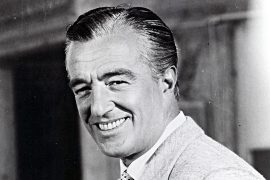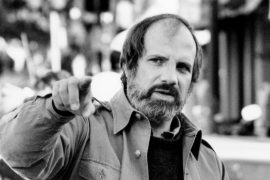Away with charity, let the dollar rule, badass selfishness moves the world forward. With such teachings, Ayn Rand still shapes many right-wing US Republicans today.
With the slogan “Ayn Rand was right!” Sections of the Republican right protested in 2009 against former US President Obama’s bank bailout. While US capitalism slides into its worst crisis since 1929, the “Tea Party” – a protest movement that sees itself in the tradition of the “sons of liberty” who led the rebellion against the English crown in Boston in 1773 – is gaining strength. Sales of Ayn Rand’s books soar.
The “tea bags” and the “libertarians” see the financial crisis as confirmation of Rand’s gloomy prophecies about the tragic end of the welfare state. The idea of a two-tier society is deeply ingrained in the American collective consciousness. According to this belief, a hard-working, productive elite is opposed to a passive majority, which robs the productive people of the fruits of their labor through taxes and social transfer payments. – But who was this pioneer of the republican right and what ideology do her books spread?
Shaped by war: A young migrant with an “American Dream”
Born Alissa Zinovievna Rosenbaum in St. Petersburg in 1905 to a wealthy Jewish family, Ayn Rand experienced the abrupt destruction of her middle-class existence at the age of thirteen. After her father was dispossessed by the Red Army, the family fled to Crimea in the chaos of the Russian Civil War. At the age of 21, Ayn Rand emigrated to the USA alone – in exile she lost contact with her family.
Attracted by the glamor of Hollywood, Ayn Rand tries to gain a foothold in the studio environment as a screenwriter. However, the reality of her life looks different at first: for a long time she has to keep her head above water with jobs in administration. Her lyrics go unnoticed – the story of her traumatic experiences with the Russian Revolution is at odds with the zeitgeist. In the cauldron of the Californian film industry with its abrupt career jumps, the radical nature of her thinking gradually develops.
I criticize the morality of charity. Above all, however, I am the creator of a new ethic that no one previously thought possible. A morality based not on faith, not on random whims, not on emotions, not on arbitrary commands, but solely on reason: a morality that can be proved logically.
Revolutionary pioneer of pure capitalism
Ayn Rand developed her philosophy of pure capitalism primarily as a novelist. Her first breakthrough came in 1943 with her novel The Fountainhead. This was followed in 1957 by her monumental work “Atlas Shrugged” (“Atlas throws off the world”). The book, which is more than a thousand pages long, has become the bible of “liberitarians” in the USA.
I am for an absolutely free economic system without regulations. I am for the separation of state and economy. Just as the separation of church and state enables religions to live together peacefully, the banishment of politics from the economy and the abandonment of regulation of production and trade will lead to peaceful cooperation, to harmony and justice between people.
The images that Ayn Rand draws in her novels are highly provocative at the time, as they are today: they populate the absolutely free market. At the center of their ideas is self-interest, which arises from human nature. Every individual should pursue their economic interests unrestrictedly and selfishly. Charity and emotions must not play a role – reason and rationality are at the core of all striving. Successful entrepreneurs and billionaires form “Supermen” – a creative class of creative individuals. They establish the vitality of an economy. Without them, the world falls into poverty, chaos and civil war.
In 1959, Ayn Rand appeared self-confident in an interview with journalist Mike Wallace. At that time she wore a dollar sign on a chain around her neck – as a commitment to pure capitalism, which in her eyes was the only way to limitless vitality. “Now is the moment for the liberation of the world,” says Rand. Their philosophy forms the perfect enlightenment: An “objectivism” solely aligned to unchangeable facts and iron laws of nature. In America in the 1950s, shaped by the social reforms of the New Deal, Rand shocked her contemporaries with her uncompromising and tough attitude.
No moment of weakness, no human affliction or emotion. Rationality for 24 hours, no loophole, no rest, no escape!
And today? – America as a country of capitalism?
In addition to the Republicans, even the Democrats in the USA have, in the eyes of the historian Thomas Frank, developed into a lobby for a wealthy and well-educated 10 percent elite: “There is no party in the country that really supports the working class.” Ever since Ronald Reagan was in office (1981 – 1989), politics has been increasingly shaped by neoliberal ideas. Welfare state institutions were dismantled. A two-class society developed – many poor versus few rich.
The surprising success of Republican presidential candidate Donald Trump can also be explained by the fact that many Americans no longer have a voice in Washington’s political system. Ironically, one of Ayn Rand’s heroic figures, a billionaire who prides himself on withholding income taxes from the state, pretends to represent the interests of those left in the lurch.
What was Ayn Rand most known for?
Ayn Rand was a Russian-born American author and philosopher. Rand authored two best-selling novels, The Fountainhead (1943) and Atlas Shrugged (1957). Her novels were especially influential among conservatives and libertarians from the mid-20th century.
What was Ayn Rand’s philosophy?
Rand called her philosophy “Objectivism”, describing its essence as “the concept of man as a heroic being, with his own happiness as the moral purpose of his life, with productive achievement as his noblest activity, and reason as his only absolute”.
What was Ayn Rand’s view of ethics?
Some of Rand’s statements suggest that she had only one, consistent ethical view: the ultimate goal is the individual’s own survival; the only way to survive long-term, i.e., over a complete life-span, is to live by the standard of man’s life as a rational being.
What is Ayn Rand’s philosophy Why is this significant?
The core of Rand’s philosophy — which also constitutes the overarching theme of her novels — is that unfettered self-interest is good and altruism is destructive. This, she believed, is the ultimate expression of human nature, the guiding principle by which one ought to live one’s life.
Why is Atlas Shrugged controversial?
Atlas Shrugged is one of the most controversial books in modern literature. It is a passionate defence of Rand’s belief that the world is best served when individuals act entirely in their own rational self-interest. Or, to put it more bluntly, they act selfishly.
What are the 4 main pillars of objectivism?
Objectivism is a system of philosophy created by Ayn Rand and has four main principles: objective reality, absolute reason, individualism, and laissez-faire capitalism.
What’s the opposite of objectivism?
The opposite of objectivism is subjectivism. Subjectivism contends that moral values are dependent on a human or divine will.
Why is objectivism criticized?
Some philosophers have criticized Objectivist ethics. The philosopher Robert Nozick argues that Rand’s foundational argument in ethics is unsound because it does not explain why someone could not rationally prefer dying and having no values, in order to further some particular value.
What is the point of Atlas Shrugged?
The theme of Atlas Shrugged, according to Ayn Rand, “is the role of the mind in man’s existence.” It is the mind, the story shows, that is the root of all human knowledge and values — and its absence is the root of all evil.
Is Atlas Shrugged a hard read?
This is not an easy book.
Is Atlas Shrugged about capitalism?
Atlas is about a new revolution, a capitalist revolution.
Is Atlas Shrugged a true story?
Atlas Shrugged is not based on a true story. It is based on what Rand thought might happen if the American economy and political enterprise were to continue without becoming more capitalist.





